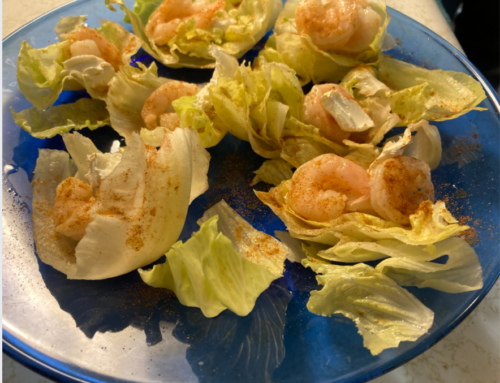I’ve personally tried the anti-inflammatory diet and as I did I notice joint pains dissappearing. I highly recommend giving her suggestions a try and finding out if its right for you. Here is a guest blog post from Dr. Jessica Black, Author of The Anti-Inflammatory Diet and Recipe Book and Living with Crohn’s and Colitis. You can order her book on Amazon.com at
Why the Anti-Inflammatory Diet is Right for You
By Dr. Jessica Black
It is quite presumptuous of me to assume that one diet fits all, correct? Well, if you take a few huge steps backwards to get a clearer view of what’s happening to people’s health, you may start to understand. Inflammation is at the root cause of 8 out of the top 10 fatal illnesses in the Unites States. The only causes of death out of those top 10, that spare inflammation’s involvement are accidents and intentional self-harm. Therefore, I see a pretty direct correlation with inflammation and illness and adopting an anti-inflammatory diet can only move someone in a positive direction. I also could present an argument for inflammation’s involvement in intentional self-harm because obviously the people who are committing suicide are struggling with more anxiety and depression than others. Inflammation and food choices in particular have both been linked directly to increased levels of depression and anxiety.
Our view of the Anti-Inflammatory diet needs to parallel how we would view just making better, healthier choices for ourselves and our families.
What the Anti-Inflammatory diet removes from the diet :
- foods that have a direct connection to increasing inflammation in the body
- foods that cause increased chance of insulin resistance due to causing spikes in blood sugar (thus resulting later on in increased inflammation)
- foods that trigger sensitivity reactions from the immune system that can lead to increased immune stimulation (thus resulting later on in increased inflammation and tissue damage)
Obviously some of the more significant illnesses such as diabetes, heart disease, cancer, stroke, Alzheimer’s disease, kidney diseases, and COPD have a direct correlation with inflammation. But what if we could tell sooner just by minor symptoms that our body was having a problem.?
Interestingly, here are some symptoms of non-detected food sensitivities and/or evidence that there is underlying inflammation in the body: headaches, fatigue, arthritis, eczema, anxiety, depression, insomnia, asthma, acne, and chronic sinusitis or upper respiratory infections. I have seen thousands of patients have these symptoms improve by taking certain foods out of their diets and adding in more healthful choices.
Some of the main foods to avoid include :
- Gluten
- Dairy
- Sugar, soda, juice, sweet drinks, high fructose corn syrup
- Honey, pure maple syrup, and stevia are okay in small amounts
- Potatoes (white, yellow, purple, red)
Some are able to tolerate some corn, make sure you purchase non GMO (genetically modified) and organic corn products
- Soy
- Occasional fermented soy products may be okay such as tempe or Tamari
- Make sure the soy you consume is also non GMO
The current research on coffee and alcohol consumption is rather compelling. Coffee consumption in mild to moderate amounts has been shown to decrease Alzheimer’s risk as well type 2 diabetes mellitus, Parkinson’s disease and liver disease (cirrhosis and hepatocellular carcinoma). In fact, a recent study revealed that coffee drinkers have a lower risk of death overall. Moderate consumption of coffee in adults equates to 3-4 cups of coffee per day and there are little health risks and various health benefits associated with drinking this amount. Beware, that coffee consumption, though is linked to elevated blood pressure and cardiac illness in some individuals.
Moderate drinkers tend to have better health and live longer than those who are heavy drinkers or do not drink at all. Moderate drinkers have fever heart attacks and strokes and are less likely to suffer from strokes, diabetes, arthritis, enlarged prostate, dementia (including Alzheimer’s disease), and several major cancers.
Now let’s discuss some things we can do in our diets to improve health and decrease inflammation. In addition to avoiding the listed foods above, we can improve what we take in on a daily basis.
Drink plenty of filtered or bottled water daily, usually 72 – 100 ounces depending on the size of the person
- Increase dark green leafy vegetables
- Increase your servings of vegetables daily
- Increase your consumption of raw foods daily
- Choose your animal products wisely such as making sure you purchase organic meats
- Don’t over cook or over heat your foods
- Use moist cooking methods to cook meats
- Include plenty of wild caught cold water fish such as salmon, mackerel, sardines
- Include omega 3 rich nuts and seeds such as hemp seeds, chia seeds, flax seeds, and walnuts
If I can leave you with one thought, I would say to get started! It is never too late to start on your health and don’t beat yourself up for what happened in your past. Don’t underestimate the changes you will be able to feel by changing your diet. I have seen profound affects in many people throughout the years I have prescribed this diet. I also want to point out that the more strictly you follow the diet, the more you will notice a change. Any treatments you are doing or medications you are taking will take effect quicker and be more effective at managing your problem.
Be Well, Dr. Jessica Black, ND.
Dr. Jessica Black graduated from the National College of Naturopathic Medicine in 2002. She attended Cardinal Stritch University prior to her medical studies and graduated cum laude with a bachelor of arts. She was given the prestigious honor of Outstanding Student of The Year in her year of graduation and had the honor of speaking to her graduating class. In 2006, Dr. Jessica published The Anti-inflammation Diet and Recipe Book after working on perfecting her recipes and selling her book locally for a few years. Dr. Black enjoys promoting her book and giving educational lectures to the community. In 2010, she co-authored Living with Crohn’s and Colitis; A Comprehensive Naturopathic Guide to Health and Wellness with Dede Cummings. She continues to share her passion for health through writing and in 2012, published the follow up to the first Anti-Inflammation Diet book, More Anti-Inflammation Diet Tips and Recipes. She has given lectures nationally and internationally. In 2014, she was given the very first prestigious award, “I am NCNM” from her medical school for her dedication to the profession and educational outreach.
Dr. Black and her husband, Dr. Jason Black enjoy dividing their time between their two Oregon clinic locations offering family healthcare to Multnomah, Yamhill, and surrounding counties. A Family Healing Center, their shared clinic, has become a residency site associated with the National College of Naturopathic Medicine and both doctors enjoy teaching the next generation of competent naturopathic physicians. She specializes in women’s medicine including natural hormone balancing for menopause and thyroid and childhood wellness including chronic asthma and acute and chronic illness in children. Because of her thirst for knowledge she continues to study and research vaccinations, hormones, new treatment ideas, and cutting edge techniques used to improve people’s health.
Dr. Black enjoys spending time with her husband and two beautiful spirited daughters in addition to staying fit and healthy through diet and activities. They enjoy skiing and spending time outdoors.
In July 2013, she launched her new website, www.drjessicablack.com offering delicious healthy recipes and cutting edge, up-to-date articles about health, hormones, food, and much more.







